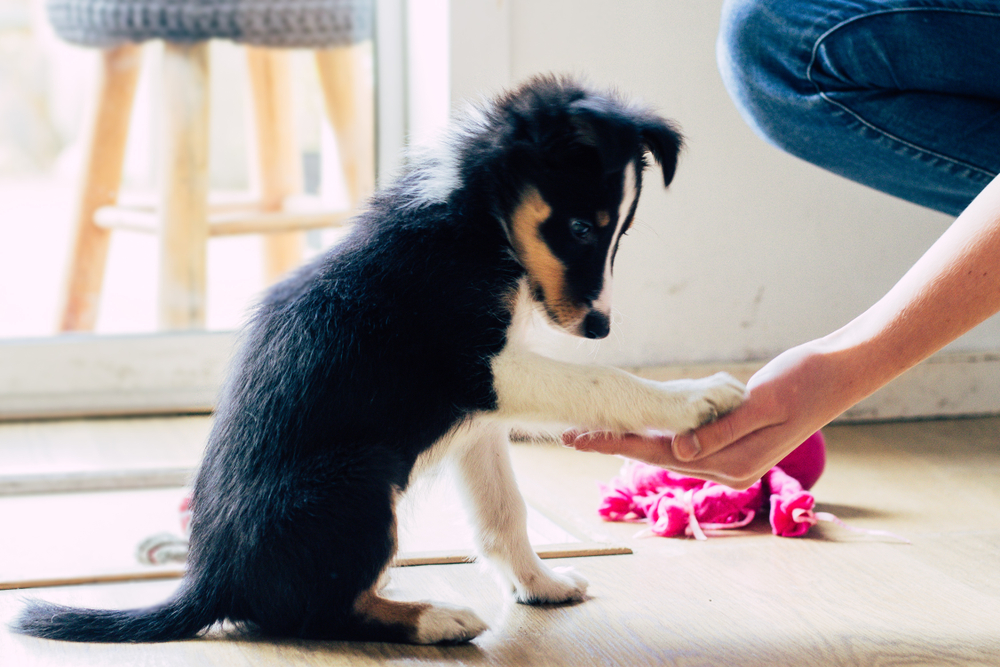Puppy Parenting 101: What to Expect During Your Puppy’s First Year

Welcoming a new four-legged pal into your family is exciting and at times challenging. A productive first year with a precious puppy is critical for ensuring a life of health and good behavior. Like a human child, puppies require lots of attention, care, monitoring, training and, most importantly, lots of patience and cuddles. Follow these guidelines from your Bayside Animal Hospital veterinary team to ensure a pawsitive first year with your new fluffy friend.
Puppy meal time
During their first year of life, puppies require extra nutrients for their rapidly growing bones and muscle, and developing organs. When choosing a pet food, always check the label to ensure the food meets the Association of American Feed Control Officials’ (AAFCO) guidelines for balanced nutrition. Additionally, use the following feeding guidelines:
- Frequency — How often you feed your puppy will vary based on breed and individual needs. Most puppies will eat three to four times a day until they reach 6 months of age, after which you can reduce their feeding to twice a day.
- Amount — Check the chart on the food bag or can, and then make adjustments based on your puppy’s specific needs. Your Bayside Animal Hospital veterinarian will also check your puppy’s weight at each visit to ensure they are growing appropriately.
- Switching to adult food — Small-breed dogs will finish growing between 9 to 12 months of age, when they can start transitioning to an adult dog food, while large breeds may take up to 18 months to become full grown. Always consult with your veterinarian prior to changing your pet’s diet.
Puppy house and crate training
House training your puppy can be challenging, but also rewarding. Puppies, especially under 4 months old, cannot hold their bladders for more than a few hours, so it’s important that you initially take them out every hour they are awake. After a few weeks, the time between bathroom breaks can be extended to every two to three hours. Always monitor your puppy for signs that they need to go outside, such as whining, circling, wandering, or going to the door. Other helpful tools for successful potty training include:
- Schedule — Take your puppy out on a regular schedule and to the same location.
- Consistency — Always use the same door to teach your pet to signal at this location when they need to go out.
- Praise — Give your puppy praise or treats after every successful outside elimination.
- Instructions — Use verbal cues before and during elimination—eventually they will learn to go on cue.
- Times — Take your puppy outside immediately after they wake up in the morning, wake from a nap, extended bouts of exercise or play, and after eating or drinking.
Crate training is a useful tool in conjunction with house training, and provides a safe area for your puppy to sleep and rest. Animals generally avoid eliminating in places where they eat, rest, or sleep, so begin acclimating your puppy to a crate when you are gone for short periods of time, or are unable to supervise. Crate training can take up to six months, so patience and consistency are important.
Puppy preventive care
During your puppy’s first six months, they will need several veterinary visits to ensure they build a strong immune system and develop appropriately. Once your puppy reaches adulthood, it’s equally important to schedule yearly, or more frequent, veterinary exams for ongoing health monitoring. Shortly after bringing your puppy home, schedule their first check-up with their Bayside Animal Hospital veterinarian to establish their vaccination schedule. Starting at around 6 weeks of age, your puppy will receive three rounds of core booster vaccinations every three to four weeks. Core vaccinations ensure your puppy remains healthy and is able to fight off common diseases that affect young dogs, including rabies, distemper, hepatitis, and parvovirus. Additionally, your veterinarian may recommend vaccines for canine influenza, bordetella (i.e., kennel cough), Lyme disease, leptospirosis, or rattlesnake venom.
Puppies commonly have a rounded belly when you first bring them home, which may indicate they’re infected with intestinal parasites. Your puppy will require two to three doses of deworming medication during their first few months to get rid of these unwanted guests, as well as a fecal test to ensure the parasites have been cleared from their gastrointestinal system. Additionally, your veterinarian will advise lifelong intestinal and external parasite control.
Puppy procedures
Once your puppy has received all their vaccinations, the next life milestone is to schedule a spay or neuter procedure, which is typically performed between 6 to 12 months of age. Your veterinarian will discuss the best plan based on your puppy’s lifestyle, behavior, and health needs. Spay or neuter benefits include:
- Decreased testicular and mammary cancer risk
- Less desire to roam and mark territory
- Decreased aggression
While your puppy is under anesthesia for their spay or neuter, this is a great time to insert their microchip, or remove any baby teeth that have not fallen out.
Puppy manners
Proper socialization will ensure your puppy has the best manners in any situation, and will help prevent a lifetime of behavior issues or stress. After your puppy is fully vaccinated, take them to areas with variable sounds and foot traffic, such as a park or a pet-friendly mall area. Ensure they have a properly fitting leash and collar and never take them off the lead in public, to ensure you are always in control. Also, have plenty of treats and praise ready to positively reinforce your puppy when they are calm and accepting of each new person or animal.
Our Bayside Animal Hospital team is excited to meet your new furry bundle of joy. Call or email our office to schedule your new puppy for their exam, or if you have any questions about caring for your new pet.


